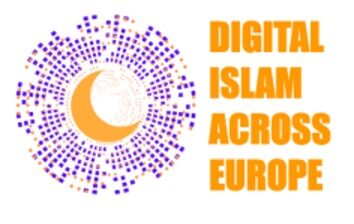SPAIN INFORMATIONAL AND EDUCATIONAL ONLINE PLATFORMS (in English and Spanish)
Spain informational and educational online platforms collection introduction
Avi Astor (Spain Team)
Rosa Martinez Cuadros (Spain Team)
Ghufran Khir Allah (Spain Team)
Gary R Bunt (UK Team and Website data analysis)
Anna Grasso (UK Team and Website data analysis)
This collection is part of the Digital Islam Across Europe project’s archive. One of the DigitIslam project outputs focuses on website data and collection analysis. The objective is to identify, catalogue and analyse Muslim organisations’ and actors’ websites (Online Islamic Environments or OIEs) from these different countries.1
The Spanish team’s web compilation includes a list of websites and blogs that offer Islamic informational and educational content. The webpages are either exclusively written in Spanish (sometimes in Catalan) or Spanish is one of the language options.
Most websites are informational and contain general and specific content on Islamic issues. For example, the “Islam Hoy,” “Islamic Bulletin,” “Mundo Islam,” and “Es Islam” web pages provide basic information on the Islamic pillars, prayers, Ramadan, and links for downloading Islamic books in Arabic and Spanish. Some of these sites, such as “Mundo Islam,” focus mainly on the Spanish context and include news on national issues. Others, such as “Islam in Spanish,” are administered in Latin America. We also find websites with a global scope where Spanish is just one of the many language options such as “The Religion of Islam”, “Islamweb.net,” and others.
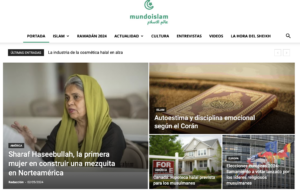
Mundo Islam website
Many of the informational blogs are dormant. Examples include “Arab Islamic” (last modified 2014), “Islamgurea TV” (last modified 2012), and “Infoummah” (last modified 2013). On the other hand, some websites contain a wealth of updated information presented in a complex and engaging format that includes audio-visual elements (see, for example, “View Islam”).
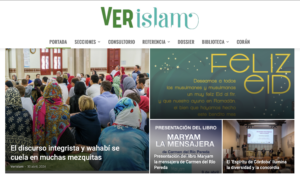
View Islam website
Most of the content is written in Spanish, although a Catalan blog called “The East Andalusia” was also identified. Additionally, Catalan content can be found in the “Abdennour Prado” blog and the “Portal of Islam in Catalonia”.
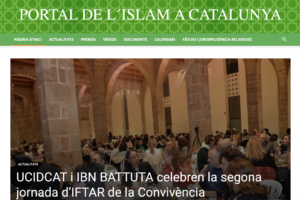
Portal of Islam in Catalonia website
Local websites and blogs are few. There are a couple of webpages on Islamic heritage research (e.g., “Islamic Toledo: Research Centre” and “Islamic Madrid: Research Centre”) and on Ceuta (e.g., “It is Islam”). Another Research-focused blog is “Research on Islamic issues” (which aims to translate Wahhabi books into Spanish, yet has been dormant since 2009). Some online sites target convert audiences (see, for example, “The Religion of Islam,” “Islam Web,” and ” The Gardens of the Soul”).
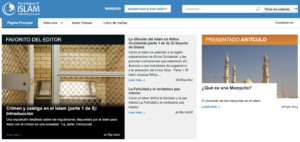
The Religion of Islam website
Another category of websites are the Q&A websites. While several websites include a section dedicated to answering visitors’ queries and providing information on fatwas (religious advice), some websites are dedicated exclusively to answering queries. In other words, there is no significant content other than answering questions and producing fatwas. These web pages highlight the frame of reference (school or approach) they depend on when explaining these fatwas. Examples include: “Learn Islam” (its frame of reference is Sheikh Khaled Abou El Fadl – professor of law at UCLA); “Islam Question and Answer” (an international, originally Arabic website, supervised by Sheikh Mohamad Salih Al-Munajid – Syrian-born Palestinian-Saudi Islamic scholar). Several blogs also focus on answering visitors’ questions. Among the listed blogs, we highlight “Obeying the Messenger Muhammad” (religious advice on contemporary issues inspired by the “Salafi” school of thought), “Sayings of the Wise of Islam” (Fatwas on Ramadan-related issues), and “Learning the Haqq” (based on the Islamic scholars: Sheik Ibn Baz and ibn al-Uthaymin).
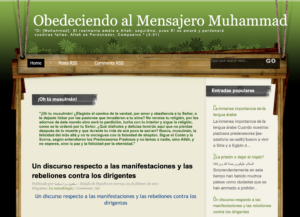
Obeying the Messenger Muhammad website
Educational websites and blogs are few. There are three leading educational websites: “EQuran School” (international website that teaches how to read the Qur’an), “Instituto Andalusia” (national, advanced studies in Islamic science), and “Sufi-Studies Centre” (blog of a centre based in Barcelona).

Instituto Andalusia website
Gender and Muslim women’s issues are addressed in some of the content. At times, women are the target audience, as seen in pages such as “Muslim Women: Bulwark and Standard of Islamic Society” and “Infoummah.” Abdennour Prado’s personal blog also includes a section on women’s issues. A few web pages, such as “Islam Web” and “Religion of Islam,” have sections dedicated to women’s issues. Additionally, we noticed that many of the blogs are set up by women, as indicated by titles such as “Umm …” (mother of …).
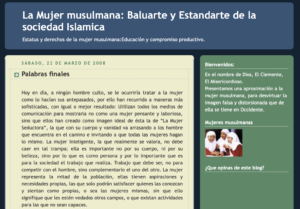
Muslim Women: Bulwark and Standard of Islamic Society website
This archive consists of an initial capture. We will be updating this list in due course. We believe this data can become a useful tool for researchers and the general public who have an interest in digital Islam across Europe as well as those who are mostly focused on the study of Islam or comparative religion within the Spanish or Southern European context. Moreover, the analysis of these sites will be part of a wider project output through presentations and publications.
- For more information on this: https://blogs.ed.ac.uk/digitalislameurope/research-findings/archiving/ back
Introducción a la Colección de plataformas de información y educación en España
Avi Astor (Spain Team)
Rosa Martinez Cuadros (Spain Team)
Ghufran Khir Allah (Spain Team)
Gary R Bunt (UK Team and Website data analysis)
Anna Grasso (UK Team and Website data analysis)
Esta colección es parte del archivo del proyecto “Islam Digital en Europa” (Digital Islam Across Europe). Uno de los resultados del proyecto se centra en la recopilación y análisis de datos de páginas web. El objetivo es identificar, catalogar y analizar las páginas web de organizaciones y actores musulmanes (Entornos Islámicos en Línea o OIL) de estos diferentes países.1
La recopilación web del equipo en España incluye una lista de páginas web y blogs que ofrecen contenido informativo y educativo sobre el Islam. Las páginas web están escritas exclusivamente en español (a veces en catalán) o el español es una de las opciones de idioma.
La mayoría de los sitios web son informativos y contienen contenido general y específico sobre temas islámicos. Por ejemplo, las páginas web “Islam Hoy”, “Boletín Islámico”, “Mundo Islam” y “Es Islam” proporcionan información básica sobre los pilares del Islam, las oraciones, el Ramadán y enlaces para descargar libros islámicos en árabe y español. Algunas de estas páginas, como “Mundo Islam”, se centran en el contexto español e incluyen noticias sobre temas nacionales. Otras, como “Islam en Español”, son administradas en América Latina. También encontramos sitios web con un alcance global donde el español es solo una de las muchas opciones de idioma, como “La Religión del Islam”, “Islamweb.net”, entre otros.

Página web de “Mundo Islam”
La mayoría de los blogs informativos están inactivo. Algunos ejemplos son “Árabo Islámica” (última modificación en 2014), “Islamgurea TV” (última modificación en 2012) e “Infoummah” (última modificación en 2013). Por otro lado, algunas páginas web contienen una gran cantidad de información actualizada presentada en un formato complejo y atractivo que incluye elementos audiovisuales (ver, por ejemplo, “VerIslam”).

Página web de “VerIslam”
La mayoría del contenido está escrito en español, aunque también se identificó un blog en catalán llamado “Sarqu-l Andalous”. Además, contenido en catalán se puede encontrar en el blog de “Abdennour Prado” y en el “Portal de l’Islam a Catalunya”.

Página web de “Portal de l’Islam a Catalunya”
Los sitios web y blogs locales son pocos. Hay un par de páginas web sobre investigación del patrimonio islámico (por ejemplo, “Toledo Islámico: Centro de Estudios” y “Madrid Islámico: Centro de Estudios”) y sobre Ceuta (por ejemplo, “Es Islam”). Otro blog centrado en la investigación es “Investigación en temas islámicos” (que tiene como objetivo traducir libros wahabíes al español, pero ha estado inactivo desde 2009). Algunos sitios en línea están dirigidos a personas conversas (ver, por ejemplo, “La Religión del Islam”, “Islam Web” y “Los Jardines del Alma”).

Página web de “La Religión del Islam”
Otra categoría de páginas web son los sitios de preguntas y respuestas. Mientras que varios sitios web incluyen una sección dedicada a responder las consultas de los visitantes y proporcionar información sobre fatwas (consejos religiosos), algunos sitios web están dedicados exclusivamente a responder preguntas. En otras palabras, no hay contenido significativo aparte de responder preguntas y producir fatwas. Estas páginas web destacan el marco de referencia (escuela o enfoque) en el que se basan al explicar estas fatwas. Ejemplos incluyen “Aprende Islam” (su marco de referencia es el Sheik Khaled Abou El Fadl, profesor de derecho en la UCLA); “Islam Pregunta y Respuesta” (un sitio web internacional, originalmente en árabe, supervisado por el Sheik Mohamad Salih Al-Munajid, un erudito islámico sirio-palestino-saudita). Varios blogs también se centran en responder preguntas de los visitantes. Entre los blogs mencionados, destacamos “Obedeciendo al Mensajero Muhammad” (consejos religiosos sobre temas contemporáneos inspirados en la escuela de pensamiento “Salafi”), “Dichos de los Sabios del Islam” (fatwas sobre cuestiones relacionadas con el Ramadán) y “Aprendiendo el Haqq” (basado en los eruditos islámicos: Sheik Ibn Baz e Ibn al-Uthaymin).

Página web de “Obedeciendo al Mensajero Muhammad”
Los sitios web educativos y blogs son pocos. Hay tres sitios web educativos principales: “EQuran School” (sitio web internacional que enseña a leer el Corán), “Instituto Andalusí” (estudios avanzados nacionales en ciencias islámicas) y “Institut d’Estudis Sufis” (blog del centro con sede en Barcelona).

Página web de “Instituto Andalusí”
En algunas páginas se abordan cuestiones de género y de mujeres musulmanas. A veces, las mujeres son el público objetivo, como se ve en páginas como “La mujer musulmana: Baluarte y Estandarte de la sociedad Islamica” y “Infoummah”. El blog personal de Abdennour Prado también incluye una sección sobre cuestiones de mujeres. Algunas páginas web, como “Islam Web” y “La Religión del Islam”, tienen secciones dedicadas a temas de mujeres. Además, notamos que muchos de los blogs son creados por mujeres, como indican títulos como “Umm …” (madre de …).

Página web de “La mujer musulmana: Baluarte y Estandarte de la sociedad Islamica”
Este archivo consiste en una captura inicial. Actualizaremos esta lista en su debido momento. Creemos que estos datos pueden convertirse en una herramienta útil para investigadores y el público en general que estén interesados en el islam digital en Europa, así como para aquellos que se centren principalmente en el estudio del islam o la religión comparada dentro del contexto español o del sur de Europa. Además, el análisis de estos sitios formará parte de un resultado más amplio del proyecto a través de presentaciones y publicaciones.
- Para más información sobre esto visite: https://blogs.ed.ac.uk/digitalislameurope/research-findings/archiving/ back
Image by hartono subagio from Pixabay
